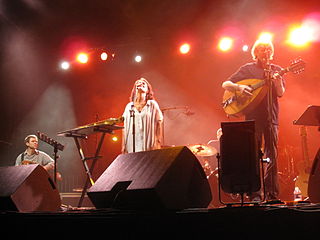
Malicorne are a French folk and folk rock band formed in September 1973 by Gabriel Yacoub, Marie Yacoub, Hughes de Courson and Laurent Vercambre. They flourished in the 1970s, broke up three times in the 1980s but re-formed twice in the early 2010s and toured from July 2012 until their last show in August 2017, after which they broke up.
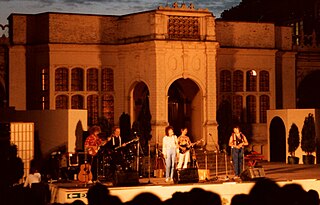
The Albion Band, also known as The Albion Country Band, The Albion Dance Band, and The Albion Christmas Band, were a British folk rock band, originally brought together and led by musician Ashley Hutchings. Generally considered one of the most important groupings in the genre, it has contained or been associated with a large proportion of major English folk performers in its long and fluid history.
Amazing Blondel are an English acoustic progressive folk band, containing Eddie Baird, John Gladwin, and Terry Wincott. They released a number of LPs for Island Records in the early 1970s. They are sometimes categorised as psychedelic folk or as medieval folk rock, but their music was much more a reinvention of Renaissance music, based around the use of period instruments such as lutes and recorders.
Gryphon are an English progressive and medieval folk rock band formed in London in 1972. They are known for their medieval and Renaissance style of music.
Circulus are a psychedelic folk/progressive rock band from South London, England, founded by vocalist Michael Tyack.

Oysterband is a British folk rock and folk punk band formed in Canterbury around 1976.

Daring Adventures is the fifth studio album by Richard Thompson, released in 1986.
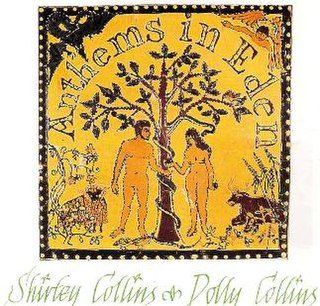
Anthems in Eden is a 1969 album by Shirley and Dolly Collins, with the Early Music Consort of London, directed by David Munrow. The album originally consisted of a 28-minute set of folk songs plus seven other individual pieces performed by the same group. The musical arrangements for these eight pieces included early music instruments, such as viols, recorders, sackbuts and crumhorns. In 1976, six new songs were recorded with a different assortment of accompanists, to replace the original seven individual songs. This 1976 album consisting of the 28-minute set plus the six new songs was released by Harvest Records under the title Amaranth. Subsequent releases have combined all fourteen pieces under the original title, Anthems in Eden.

Richard Allen Harvey is a BAFTA Award-winning English musician and composer. Originally of the mediaevalist progressive rock group Gryphon, he is best known now for his film and television soundtracks. He is also known for his guitar concerto Concerto Antico, which was composed for the guitarist John Williams and the London Symphony Orchestra.

Red Queen to Gryphon Three is the third studio album made by the progressive rock band Gryphon. The album was released on Transatlantic Records in the UK with a blue cover, while Bell Records released the album in Canada with the cover border in black.

Treason is the fifth album by progressive rock band, Gryphon, originally released in 1977 by Harvest, catalogue number SHSP 4063. It would be their last album for over 40 years.

Raindance is the fourth progressive rock album by Gryphon, originally released in 1975 by Transatlantic, catalogue number TRA 302. It is the penultimate Gryphon album, and the last to include contributions from guitarist Graeme Taylor.
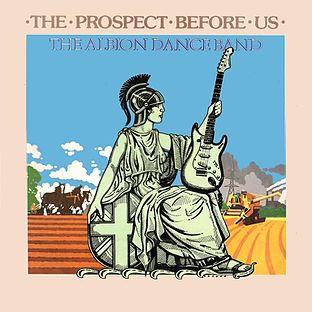
The Prospect Before Us is a British folk rock album, by The Albion Dance Band, which was released in 1977 on the EMI Harvest label.

Un Peu de l'Âme des Bandits is the second album by Belgian avant-rock band Aksak Maboul. It was recorded at Sunrise Studio in Kirchberg, Switzerland in February and August 1979, and released on LP in January 1980 on founding member Marc Hollander's Belgian independent record label, Crammed Discs. At the time the band had changed the spelling of their name to "Aqsak Maboul", and this is reflected on the album's record sleeve. When the album was re-issued on CD in 1995 the spelling of their name reverted to "Aksak Maboul".

Midnight Mushrumps is the second studio album made by the band Gryphon. The album was released on Transatlantic Records in the UK, catalogue number TRA 282.

To Keep from Crying is the second album by progressive folk band Comus, released in 1974. It featured a notably different lineup from their other releases, with the violin/viola and woodwind spots replaced by keyboards and a conventional drum kit. The album's content has also been noted as sounding more mainstream than their earlier work, which centred more in conventional progressive rock and folk.
Stars In Battledress are an English musical duo featuring brothers Richard and James Larcombe. They are notable for their complex but tuneful compositions, their unorthodox fusion of folk music sources and British/American art rock influences, and for their intricate and allusive lyrics.
Medieval folk rock, medieval rock or medieval folk is a musical subgenre that emerged in the early 1970s in England and Germany which combined elements of early music with rock music. It grew out of the British folk rock and progressive folk movements of the late 1960s. Despite the name, the term was used indiscriminately to categorise performers who incorporated elements of medieval, renaissance and baroque music into their work and sometimes to describe groups who used few, or no, electric instruments. This subgenre reached its height towards the middle of the 1970s when it achieved some mainstream success in Britain, but within a few years most groups had either disbanded, or were absorbed into the wider movements of progressive folk and progressive rock. Nevertheless, the genre had a considerable impact within progressive rock where early music, and medievalism in general, was a major influence and through that in the development of heavy metal. More recently medieval folk rock has revived in popularity along with other forms of medieval inspired music such as Dark Wave orientated neo-Medieval music and medieval metal.

Restoration Ruin is an album by Keith Jarrett on which he performs multiple instruments, and sings his own lyrics. Recorded and released on the Atlantic Records subsidiary Vortex in 1968, the album remains unique in Jarrett’s catalogue, displaying a sound largely influenced by folk and progressive rock. It can be seen as the first part of an experimental period which explored neither traditional jazz nor classical music. Here Jarrett overdubs himself on various instruments, similar to the tribal Spirits (1985) or especially the free funk No End. "Sioux City Sue New" was released as a 45 rpm single, backed with "You're Fortunate." In 1999, Collectables Records reissued the album paired with the Art Ensemble of Chicago's Bap-Tizum.
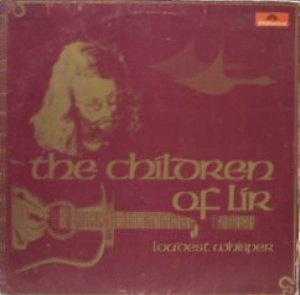
The Children of Lir is the debut album by Irish folk rock/progressive folk group Loudest Whisper. It is the studio adaption of the musical of the same name that was performed in Fermoy, Ireland in 1973. The album was released on LP record in Ireland by Polydor Records in 1974 in a limited edition of 500 copies.















